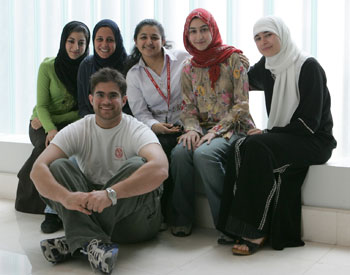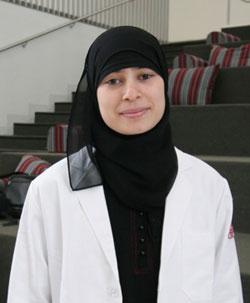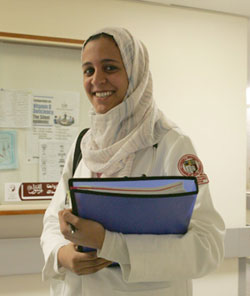Getting the lab flavor

Biomedical research “is so interesting, it makes you want
to be involved,” says Amira El Sherif, seen (second left) with
her colleagues Noor Al Khori, Manisha Deb Roy, Heba Haddad,
Zeinab Ammous and (foreground) Imran Farooq.
The next few weeks promise a period of discovery for groups of WCMC-Q students, chosen for this year’s summer research fellowships in the US.
Six students from the Class of 2010 are at Cornell’s main campus in Ithaca, while a further six from the Class of 2009 set out early July for Weill Cornell Medical College in New York City.
They are working alongside some of the University’s top scientific and biomedical researchers, gaining insight into projects that range from investigation of heart rhythm disorders to stem cell research and gene therapy.
“Getting the lab flavor” is important at this stage, said Zeinab Ammous (Class of 2009), who is joining the team of Dr. Ronald Crystal, professor, and Chairman of the Department, of Genetic Medicine at Weill Cornell.
“We get a chance to apply some of the things we already studied, including some of the basic techniques such as running PCRs (polymerase chain reactions). And it’s a chance to know how research labs work. If you are interested in being a researcher after med school, this will help in making the decision.”

Zeinab Ammous: first visit to New York will
be a chance to understand how research
labs work.
At the same time, the experience gives the Doha-based groups opportunities to live the life of ordinary Cornell or Weill Cornell students in the US, to meet some of their colleagues there – and to enjoy something of what New York City and Ithaca have to offer.
Competition for places
The twelve students were selected for summer research fellowships as part of a program set up in 2003. With record numbers applying this year, competition for places was strong, said Senior Associate Dean for Research, Dr. Gary Schneider.
“I think it has really caught on. The students begin to realize the importance of participating in research during their medical education. They are taking the application process seriously because they know it is competitive.”
Meanwhile, two medical students are working in Doha on a project involving researchers at Weill Cornell in New York and in Qatar, and physicians at Hamad Medical Corporation (HMC.) Part of an investigation into pulmonary gene expression that is under way in Dr. Crystal’s lab, the Doha study is led by Dr. Lotfi Chouchane, professor of genetic medicine at WCMC-Q.
Learning the process
At the heart of the research experience is the opportunity to develop an understanding of the process of scientific investigation.
“Students typically do not appreciate the thought process that is involved in research until they have experienced it first hand,” said Dr. Robert Gilmour, professor of physiology in the department of biomedical science at Cornell’s College of Veterinary Science. “In addition, most students have been exposed to information that has been provided by others and have little experience of the joys of discovery.”
Working with Dr. Gilmour is Nigel Pereira (Class of 2010), and he pointed out the importance for a physician of gaining this insight: “To become a good physician, you need to know the basic principles of science and how science advances. You can only appreciate that completely when you are part of the research field.”
In addition, the experience prepares the student for lifelong learning through reading the literature, said Dr. Schneider: “If you are going to be a lifelong learner, to continue to read the medical literature, then you have to have an understanding of the research process and the tools used in research. Probably about 80 percent of the literature is research-based.”

Amira El Sherif: interest in biomedical
research developed at WCMC-Q.
Wide range of tasks
The fellowship program enables WCMC-Q students to gain both breadth and depth of understanding of the work of investigators at Cornell and Weill Cornell.
Dr. Crystal ensures that the area of work and type of activities undertaken are agreed through a process of consultation.
“I meet with each student, discuss the student’s interests and describe the projects we think he or she would enjoy and profit from,” he explained. “We provide reading materials that describe the projects, such as prior papers from the laboratory and current grants. From this and discussions with other members of the laboratory, we come to an agreement as to what the student will focus on.”
Naturally, the assignments they work on vary between labs. The tasks may include data gathering and analysis, with some patient interviewing; computer simulations; experiments at the bench; and observation of clinical procedures.
Beyond the immediate work of the investigation, there are regular lab meetings – at least twice a week in Dr. Crystal’s lab - and educational activities to take part in.
“You have to be there, motivated and excited – and prepared for anything!” commented Ammous, happily anticipating the need to ‘go with the flow’ and put in whatever hours in the lab were necessary.
Making a contribution to the team…
The excitement of taking part in cutting-edge research is not to be missed, said Amira El Sherif (Class of 2009) who had experience of research work during her time as an undergraduate at the American University in Cairo.
“I didn’t come into the Medical Program thinking that I wanted to do research. I was more clinical in orientation. My interest developed here (at WCMC-Q.) It’s being exposed to everything that’s going on right now – it’s so hot, so interesting, it makes you want to be involved.”
This eagerness can feed into the work they do in the lab, observed Dr. Gilmour. “Students at this level have limited experience, but they have enthusiasm and a good work ethic. Consequently they can generate a surprisingly large body of information.
“In addition, they come to a project without any preconceived notions and they tend to ask a lot of questions, which oftentimes force their mentors to think about the project in ways that they might not have done otherwise.”
Down the road, their ideas may even lead to papers and participation in important meetings. “We have had many students who generate new ideas that become important research goals,” said Dr. Crystal. “Over the years, many students have contributed to research papers, including where the student is the first author. We have also had many present talks at national and international meetings.”
…and to Qatar
There is also awareness among some WCMC-Q students that, by taking part in research in the US, they are preparing to contribute to the future research capacity of Qatar.
Qatari student, Mohammed Al Hijji (Class of 2010), said that this was an important factor in his decision to apply for a fellowship.
With its long history of research, well-established infrastructure of labs and large teams of investigators, Cornell University offers possibilities for scientific investigation that are not yet available in Qatar, he noted. In the future, however, he hoped to make a contribution to transforming the situation.
“We are focussed on developing the scientific field in Qatar…For this, we need a good base in research that will lead to new discoveries. There are plans to open a research center and people will need to fill the positions in the research teams. As a Qatari, it’s my role to help fill these positions.”
